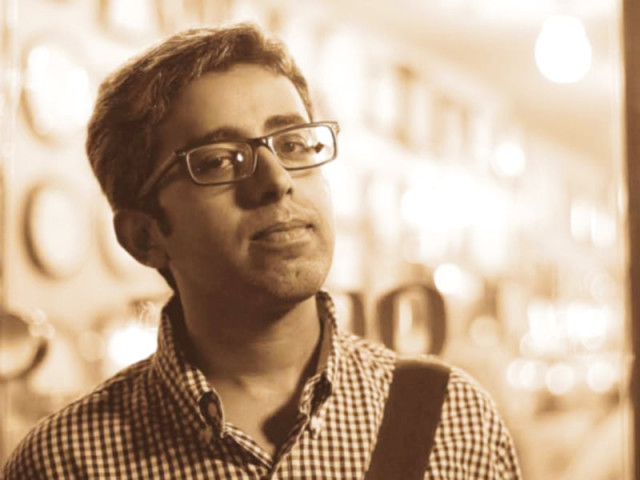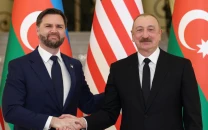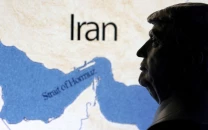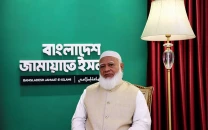The storyteller: Between literature and life, he’d choose life any day
Bilal Tanweer talks to The Express Tribune as his debut novel creates waves in the literary world.

Bilal Tanweer’s book is set in the city of lights, which he calls home. PHOTO: AURANGZEB HANEEF
When I met Bilal Tanweer for the first time a few years ago, the soft-spoken writer left me a bit nervous. Now, as I read through his brilliant debut novel The scatter here is too great, I know it was his deep observation that intimidated me back then. He doesn’t miss a thing. Having gotten to know him better, Tanweer no longer daunts me. His writing still does.
He takes time to open up in an interview. In that sense, the 30-year-old author is a bit like the city of lights itself. His debut novel is Karachi-centric. In the midst of multiple characters leading inter-connected lives, Tanweer is the qissa-goh — the storyteller who tells stories that are usually mired in the debris of bomb blasts.
The scatter here is too great shows a love-hate relationship of the characters with Karachi. They accept Karachi with all its battle scars. For Tanweer, this city is still home, even though he has been living in the bubble of academic campuses for many years. “I am from Karachi. This book is an outcome of my engagement with the city. It speaks to me, resonates with me. The characters, their languages — all are from Karachi.”
In his words, Karachi is a hard city which has violence and fear but there is a flip side to it. “Because of the large number of migrants, it affords a certain freedom, a certain anonymity. Karachi is a city of contrasts.”
The scenes where the characters travel by bus in Karachi, have clandestine meetings in a Suzuki FX, or go spend holidays with their naani, will speak to every Karachiite. “I am from a middle-class background. That’s the world I’ve known. So it is a conscious decision that I have worded it in this way.”
Launched recently, the book is being received very well. Some of the best publishers in the world have agreed to take on this Pakistani writer’s first literary effort. “My best hopes for this book have been met. I am deeply grateful. Anything more that comes my way would be a bonus,” Tanweer says with humility.
The book comes at a time when anything with the hashtag of Pakistan and terrorism quickly catapults to global attention, yet the book is clearly honest and is not aimed at a particular readership. One can clearly foresee that this novel has the potential to be adapted into a screenplay for a feature film.
“The first reader is the writer himself. As long as my writing is honest to my experience of the world, I am satisfied,” says Tanweer. Almost offended by the idea that someone who writes about the problems of Pakistan may be doing it for instant success, he remarks, “Fiction writers may use these events, but that just means this is a part of their experience, which comes into their work. I don’t think any of them is writing for an imaginary reader in NYC. I am certainly not.”
Tanweer does not deny the autobiographical touches in the book. “One big reason I write is so that I can give away a part of myself.”Pouring a lot of one’s self into a work of literature is not easy. “It took me five years to write this novel. The nature of the craft of fiction writing is different from journalism,” shares the writer. Tanweer, who has tried his hand at the latter, and has used that experience to write soliloquies of ‘the writer’ who is one of the key characters in the book. “In journalism, the events are important. But in fiction writing, the writer uses the events to show how they affect the characters. It’s hard but I quite love it. “
Tanweer, who is currently teaching fiction writing at the Lahore University of Management Sciences, agrees that this is, in some ways, a good time for Pakistani writers. Apart from international attention which helps get better publishers, there are other benefits. “There is so much up in the air. As writers, we resultantly have a lot more to play around with.”
The book’s treatment of violence and how it affects people’s lives is powerful.
“In times of crisis, we are faced with the possibility of death. That helps us filter the essential from the non-essential. Artists and writers are supposed to take on subjects like war, death and the fragility of the human body.”
While writing is everything to him, Tanweer has no ambiguity that living is a far more complex thing than reflection and writing. “The really hard thing is living as a good person. Inside, most of us are petty and insecure. It is far harder to lead a decent life than to write a great book.”
Published in The Express Tribune, December 17th, 2013.
Like Life & Style on Facebook, follow @ETLifeandStyle on Twitter for the latest in fashion, gossip and entertainment.



















COMMENTS
Comments are moderated and generally will be posted if they are on-topic and not abusive.
For more information, please see our Comments FAQ